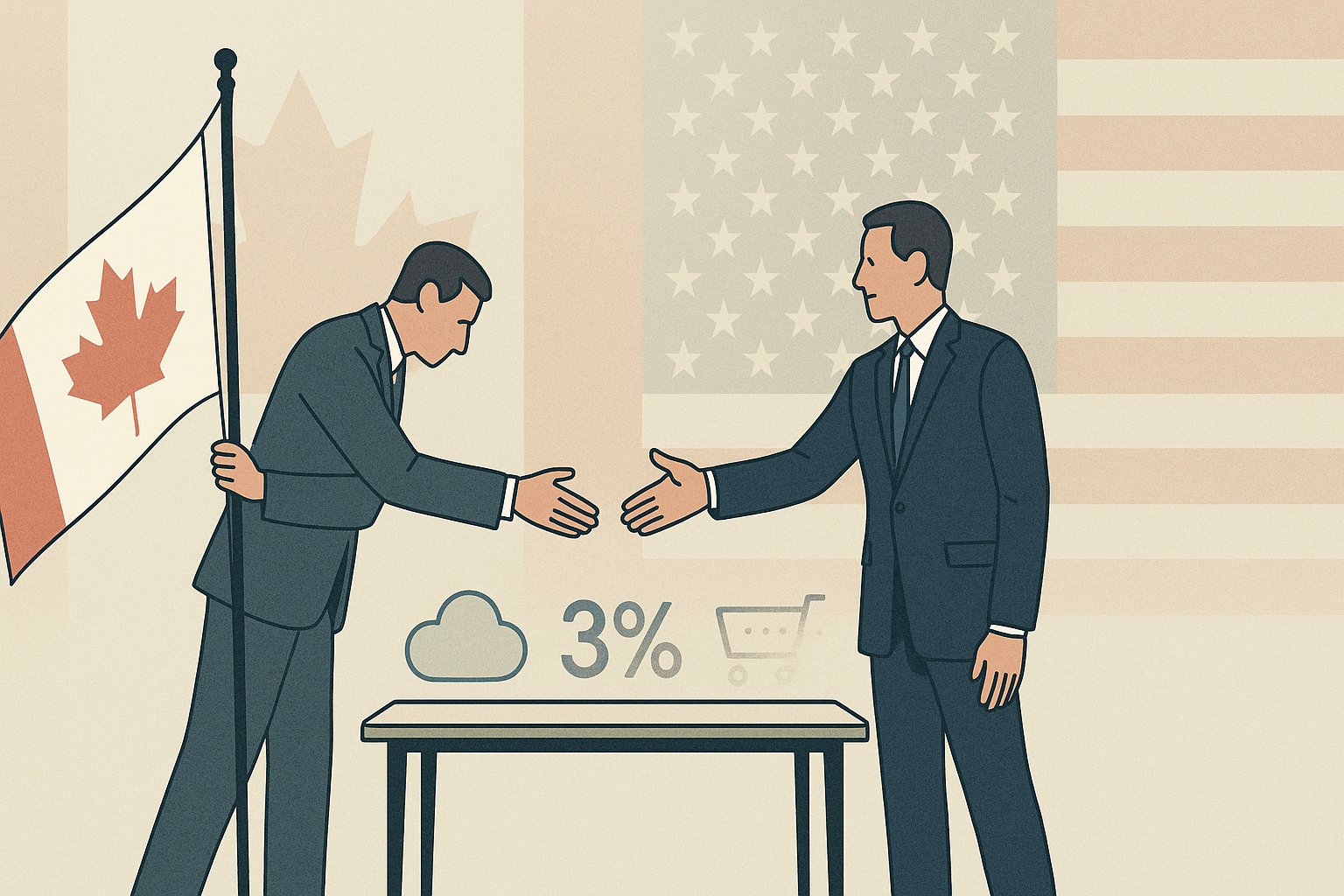In a move that surprised precisely no one who's been paying attention to the delicate dance of US-Canada trade relations, Ottawa has officially rescinded its digital services tax in what appears to be a strategic pivot to advance broader trade negotiations with the United States.
The tax, which would have imposed a 3% levy on revenue generated by tech giants within Canadian borders, had been a persistent irritant in bilateral relations, with Washington viewing it as unfairly targeting American companies like Google, Amazon, and Facebook. I mean, they weren't wrong - but that's beside the point.
What we're witnessing here is a classic case of pragmatic realpolitik in trade negotiations. Canada, recognizing that the potential gains from comprehensive trade agreements far outweigh the revenue from a targeted tech tax, has essentially traded a pawn to protect its queen. The Trudeau government, for all its progressive posturing, understands that Canada's economic prosperity remains inextricably linked to its southern neighbor.
Look, there's a model I often use when analyzing these sorts of diplomatic concessions: the "Strategic Sacrifice Framework." In this model, countries willingly abandon politically popular but economically marginal positions to secure advantages in areas of genuine national interest. It's the foreign policy equivalent of eating your vegetables before dessert.
The conventional wisdom suggests Canada has "caved" to American pressure. But that's an oversimplification that misses the sophisticated game theory at work. Canada isn't surrendering; it's reallocating its negotiating capital toward higher-priority objectives - likely including protections for its dairy industry, softwood lumber exports, and critical minerals supply chains.
This move comes at a particularly interesting moment in the global tax landscape. The OECD has been laboring, with all the speed and efficiency of a three-toed sloth on tranquilizers, to establish a comprehensive international tax framework for the digital economy. Canada's willingness to park its unilateral measures could be interpreted as a vote of confidence in this multilateral process - or more cynically, as recognition that fighting this particular battle alone was becoming increasingly untenable.
The thing is, digital taxation represents the collision of 21st-century business models with 20th-century tax systems. When Facebook can generate billions in advertising revenue from Canadian users without maintaining significant physical presence in the country, traditional tax frameworks begin to resemble a horse and buggy in the age of electric vehicles - quaint, but hopelessly outmatched.
For tech giants, this represents a temporary reprieve in one jurisdiction, but the broader trend toward digital taxation continues globally. The EU, UK, and various Asian nations maintain similar measures, suggesting that while Canada may have blinked, the pressure on tech companies to contribute more equitably to national tax bases isn't disappearing.
Anyway, the timing of this announcement suggests coordination with ongoing discussions about revitalizing North American economic integration. Post-pandemic supply chain vulnerabilities and increasing competition from China have created renewed impetus for strengthening continental economic ties. Canada's concession on digital taxation may be the lubricant needed to reduce friction in these more consequential conversations.
What remains unclear is whether this diplomatic flexibility will actually yield the desired results. The history of Canada-US trade relations is littered with examples of Canadian concessions that were rewarded with... well, additional American demands. There's always a risk when you show your cards too early.
In the end, Canada's digital tax retreat illustrates the perennial challenge of smaller economies navigating relationships with dominant trading partners. The asymmetry of power requires strategic flexibility and willingness to make calculated compromises. Which, I guess, is just a fancy way of saying sometimes you need to know when to fold 'em.
2025 Bull Run: Why This Time Might Actually Be Different (But Probably Isn't)
The prophecies are spreading across Reddit forums, Discord channels, and crypto Twitter with the fervor of a religious revival: 2025 will bring the next great crypto bull run. The faithful are accumulating, influencers are prophesying, and the PowerPoint presentations explaining why "this time is different" are multiplying faster than NFT collections in 2021.
I've seen this movie before. We all have. It's the one where everyone gets wildly rich on paper, purchases digital real estate at prices that would make Manhattan developers blush, and then watches their portfolio perform a swan dive that would score a perfect 10 at the Olympics.
But let's entertain the possibility. What's different this time around?
The conventional bull case hinges on a convergence of factors that, admittedly, do present an interesting narrative. First, we have the Bitcoin halving scheduled for April 2024, which will reduce the rate of new supply entering the market. Historically, halvings have preceded major price appreciations, though with a sample size smaller than a hedge fund manager's tax rate, statistical significance remains questionable.
Second, there's the anticipated evolution of the regulatory landscape. The SEC's approach to crypto regulation has been about as clear as mud wrestling at midnight, but there are signs that a more coherent framework might emerge. A less hostile regulatory environment could potentially unlock institutional capital that has thus far remained on the sidelines, watching the crypto circus with equal parts fascination and horror.
Third, the macroeconomic picture may turn more favorable if central banks pivot to interest rate cuts in response to cooling inflation. The liquidity tsunami that fueled the last bull run had largely receded as central banks tightened monetary policy. A return to easier money conditions would represent a tailwind for risk assets broadly, with crypto potentially catching a disproportionate share of speculative flows.
A model that I often use for understanding crypto market cycles is what I call the "Narrative Acceleration Framework." In this model, market movements are driven less by fundamental improvements in technology or adoption and more by the velocity and reach of compelling stories about future value. The 2025 bull run narrative is already taking shape, and its mere existence becomes a self-reinforcing mechanism drawing capital and attention.
Look, I'm not dismissing the possibility outright. Markets have an uncanny ability to make fools of both perma-bears and perma-bulls. But there's something particularly amusing about the clockwork certainty with which crypto enthusiasts predict these cycles, as though the financial markets operate on a predictable four-year schedule like presidential elections or the World Cup.
The thing is, beneath the hype and price predictions calibrated to generate maximum YouTube thumbnail clickability, there are genuinely interesting developments in the space. Layer 2 solutions addressing Ethereum's scaling challenges, real-world asset tokenization, and improvements in cross-chain interoperability all represent meaningful technical progress. Whether these justify trillion-dollar market capitalizations is another question entirely.
What's often missing from these bull market prophecies is an acknowledgment of the obstacles. Regulatory uncertainty hasn't disappeared; it's evolved. The institutional adoption that was supposed to validate the last cycle materialized only partially. And the sector still struggles with security vulnerabilities that would make traditional financial institutions break out in hives.
The psychology driving these cyclical predictions is fascinating in itself. There's an almost religious quality to the belief in inevitable price appreciation - a prosperity gospel for the digital age. "Hold through the darkness, and ye shall be rewarded" could be inscribed on crypto's virtual tablets.
I mean, maybe they're right. Maybe 2025 will indeed bring another exuberant bull market that turns Telegram group admins into paper billionaires. But I'd suggest approaching such predictions with the same level of skepticism you'd apply to a time-share presentation or an email from a Nigerian prince offering to share his fortune.
In the meantime, the smartest players will focus less on timing the market and more on identifying which projects are building something of enduring value. Because when the inevitable correction comes - and it always does - those are the only ones that will matter.
Anyway, I'll see you all at the peak of the next bull run, when we're once again paying $200 in gas fees to purchase a JPEG of a cartoon animal wearing sunglasses. Some traditions never die.




